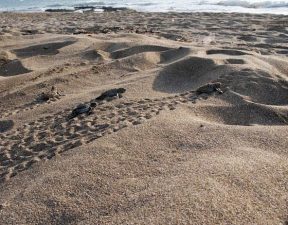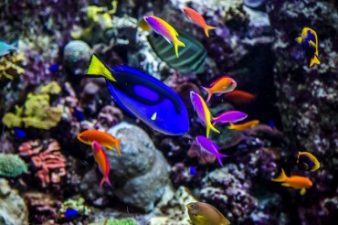 Greenpeace activists take on bottom trawlers. But in Oman, they no longer have to.
Greenpeace activists take on bottom trawlers. But in Oman, they no longer have to.
Bottom trawlers were forced to set sail after Oman effected its ban on this destructive “fishing” practice. A small Gulf country that borders the United Arab Emirates, Oman is renowned for its incredible coral reefs and marine diversity. But 16 large factory fishing boats operating off shore had jeopardized the Sultanate’s marine health and put many fishermen out of work.
First put in place by the Ministry of Agriculture and Fisheries in May 2009, the ban stipulated that licensed bottom trawlers would have to pack up their nets and leave the Sultanate’s waters within two years. And now, their time is up. Oman is the first Gulf country to officially ban bottom trawling.
Bulldozing the sea floor
Bottom trawlers drag massive nets with mouths sometimes as large as a rugby field across the sea floor or sea mount. These nets are kept in place with “doors” that can weigh up to five tons.
Used to capture bottom-dwelling fish, the nets are like bulldozers that raze everything in sight, including non-edible marine creatures and sensitive coral reefs. Areas destroyed by commercial trawling won’t recover for centuries, according to the Gulf Coast Preservation Society in the United States.
Local fishermen express huge relief
The Times of Oman reports that local fishermen are deeply relieved that the trawlers are gone. One man told the paper that he would spend 18 hours at sea and still have to buy his fish at the market. Bottom trawlers sucked up all of the catch, and forced many subsistence fishermen to raise their prices to unsustainable levels.
Local Omanis are in shock. In the Middle East, bans such as those on shark finning and owning endangered wildlife are often ignored. But the Sultanate contacted trawlers to remind them that their two year grace period would soon end, and on Wednesday followed through on banning them from Oman’s territorial waters.
“I am quite sure that fish prices will come down now as our boats will be full of different varieties of fish, like it used to once,” a local fisherman, Haroon Al H’sani, told the Times.
Oman leads the green way
Oman’s environmental protection leadership can be traced back to March 1979 when the the Council for Conservation of the Environment and Prevention of Pollution (CCEPP) was first established. Then in 1996, the Sultanate created their National Conservation Strategy.
Since then, earth trends reports that 32 Marine and Littoral Protected Areas have been established.
When the Gulf waters begin to teem with life and local fishermen can make a decent living again, hopefully Oman’s leadership will rub off on other Gulf countries. This is a huge victory for our oceans. And a milestone for the Middle East.
More on commercial and illegal fishing practices in the Gulf:
Reporter’s Notebook: Tasteless Dry Shark Fin For Sale
Working with Local Fisherman to Tackle Shark Finning
Hope Amidst Dubai’s Marine Destruction




Just want to say it’s odd to refer to Oman as a small nation bordering the UAE.
While it’s true it has a smaller population of the UAE, the super majority of the population of the UAE are not citizens and in fact are imported workers.
When you only count citizens of each nation Omanis actually outnumber UAE citizens by about 600,000 according to Wikipedia.
Oman is also 4x larger than the UAE in terms of total land area.
The only area where UAE makes Oman seem like a small neighboring nation is in terms of their image on the World stage. UAE’s has made a pointed effort using some of its vast oil wealth to ensure its presence on the world stage cannot be missed. Oman on the other hand has made no such effort despite being one of the wealthiest nations in the world (though far short of the UAE citizen per capita)
yes – its a nice move – most Omanis live along the coast – and the trawlers caught, froze and shipped to the far east all they caught – so not the people whose income is fishing should gradually see a return of fish stocks
I think this is HUGE! Oman is effectively cutting off their own purse strings for the environment’s sake (as well as local fisherman). That’s such an important move for the Middle East.
That’s great news; the boats were are drain on Oman’s resources – employment, environment and food resources. While the fish they scoured may not directly be caught by the local Omani fishermen they were part of the food chain the Omani fishermen relied on.